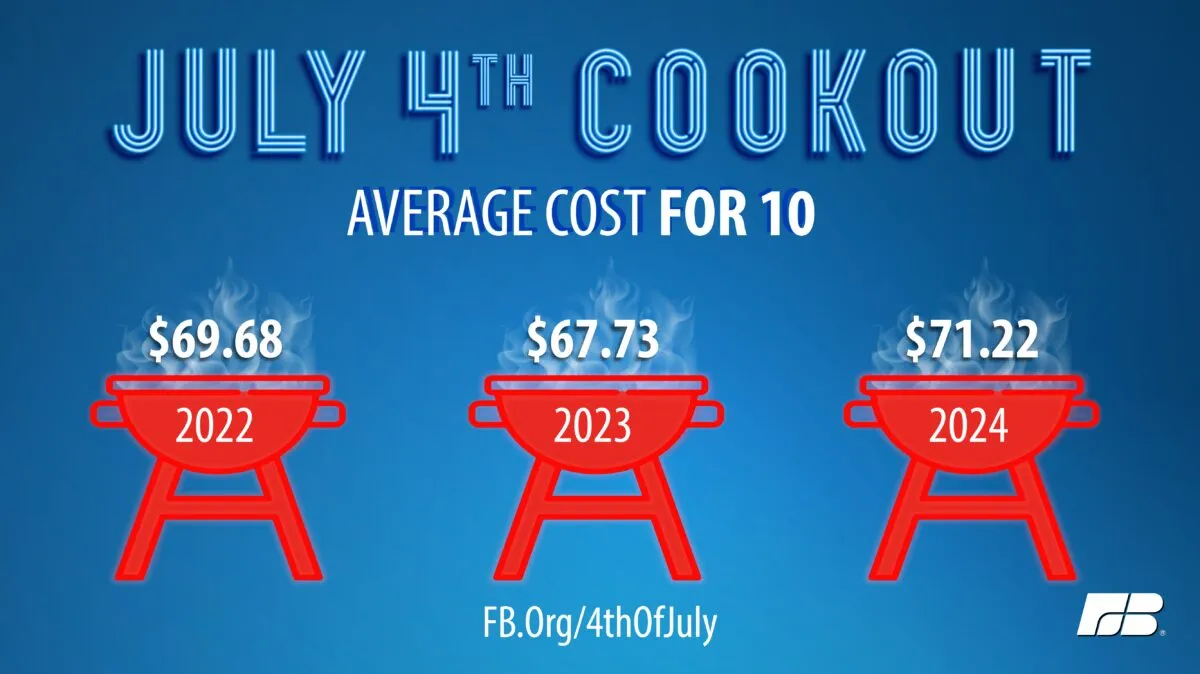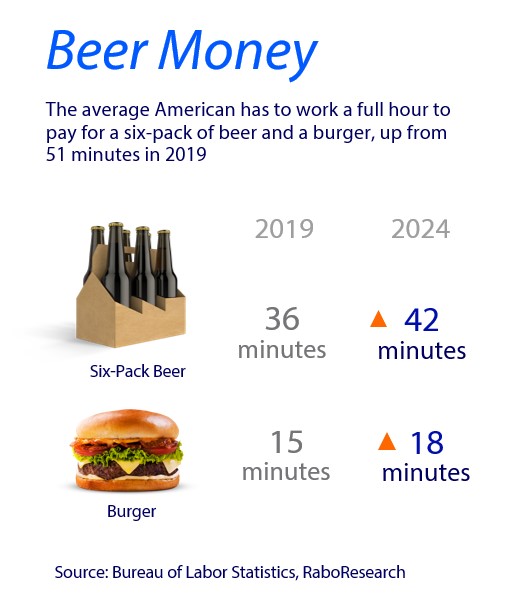Analysts agree you’ll pay more for the July 4 barbecue this year. But just how much depends on who you ask.
According to a survey from the American Farm Bureau Federation, the cost of a typical holiday cookout menu jumped 5% higher than last year and 30% higher than five years ago.
Rabobank also released its 2024 BBQ Index which points to food inflation across the board for the majority of this year’s cookout staples.
“The average American is going to have to work about nine hours to afford this year's barbecue for 10 people at $99,” says Tom Bailey, Rabobank Consumer Foods senior analyst. “That's a 32% increase from 2019 in terms of how hard they're having to work to afford this year's barbecue.”
Different menu, same trends
AFBF reports the average cost of a summer cookout for 10 people is $71.22, a result of ongoing inflation sweeping across the economy.

The AFBF survey shows the largest year-to-year price increase is for lemonade, followed closely by ground beef. Citrus greening has spread to California, driving lemon prices even higher. Drought conditions in recent years forced ranchers to sell many of their cattle early, reducing the supply for the summer grilling season.
Check out the full list of prices on AFBF’s menu:
- 2 pounds of ground beef: $12.77 (+11%)
- 2 pounds of chicken breasts: $7.83 (-4%)
- 3 pounds of pork chops: $15.49 (+8%)
- 1 pound of cheese: $3.57 (+1%)
- 1 package of hamburger buns: $2.41 (+7%)
- 2 ½ pounds of homemade potato salad: $3.32 (-4%)
- 32 ounces of pork and beans: $2.49 (+2%)
- 16 ounces of potato chips: $4.90 (+8%)
- 13-ounce package of chocolate chip cookies: $3.99 (+2%)
- ½ gallon of ice cream: $5.65 (+7%)
- 2 pints of strawberries: $4.61 (+1%)
- 2 ½ quarts of lemonade: $4.19 (+12%)
Farmers are also feeling the effects of high prices. “They’re price takers, not price makers,” says AFBF chief economist Roger Cryan. “Their share of the retail food dollar is just 15%, but they still pay elevated fuel, fertilizer and other supply prices.”
Rabobank focused on 8 menu items to show how much more will you spend per person:
- American cheese: 40 cents (+7.63%)
- Beer: $2.66 (+2.19%)
- Ground beef: $1.41 (+ 3.77%)
- Ice cream: 72 cents (+2.75%)
- Potato chips: 83 cents (+2.12%)
- Soda: $1.21 (+10%)
- Tomato: 26 cents (+5.56%)
- White bread: 31 cents (+1.76%)
Only two staples decreased in price – chicken breast at $1.01 and lettuce at $1.07. Rabobank’s grand total is $9.89 per person.

But Bailey says consumers should think twice about going out to eat this July 4.
“It’s nearly five times more expensive to eat out of home than to eat at home,” he notes. “It’s nearly $100 for a family five to go out for a simple meal today. So, it’s clearly more affordable to have a barbecue at home to eat at home.”
Places to save this barbecue season
There are still ways to feed family and friends this July 4 without breaking your financial budget.
Drink water. According to the Rabobank report, beverages — soda and beer — comprise nearly 40% of the total cost of the barbecue in 2024.
Swap proteins. Chicken is cheap. Christine McCracken, Rabobank Animal Protein senior analyst notes that beef is three times and pork is roughly twice the cost of chicken. “If you’re looking for something that hits that value price point and you’re trying to feed a lot of people,” she says, “obviously chicken is still your best alternative.”
Make potato salad. The Bureau of Labor Statistics reports potatoes cost around $0.96 per pound, 4.4% less than they did last year. However, the same savings can’t be found with potato chips, which are up over 2%.
Dollars and cents
While wages are up about 25% in five years, so is food. At a 30% increase, Bailey says consumers are waving the white flag on inflation.
“Finally, they're tapping out,” he says. “They're rolling over, they're adjusting their behavior. They're eating more at home. They're spending less and they're deal hunting, but they will occasionally pay up for experience. They want memories, not leftovers.”